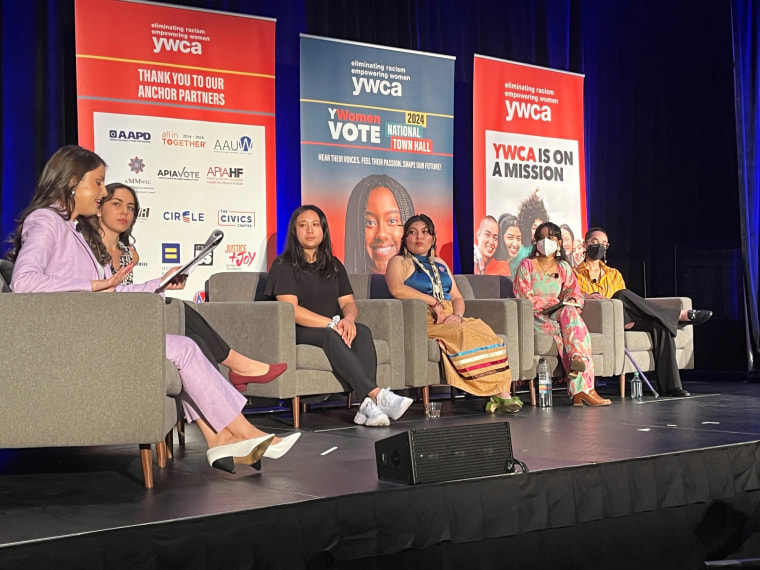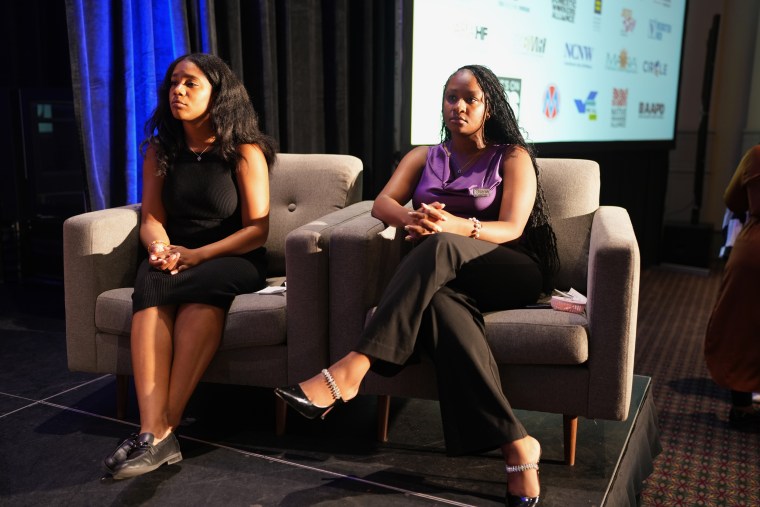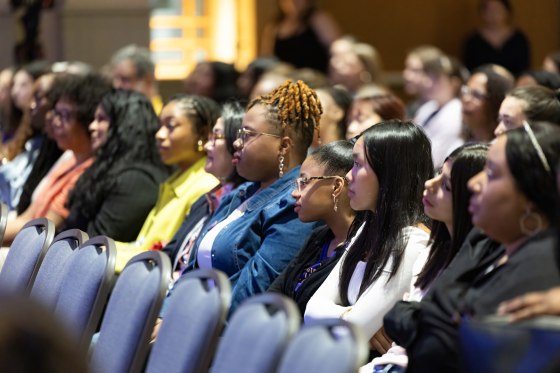Young women voters played a critical role in the 2020 elections. And they’re expected to be a deciding factor once again in November.
Over 40 million Gen Zers — between the ages of 18 and 27 –- will be eligible to vote this year. That includes 20 million women and four million newly eligible new women voters who aged into the electorate since the 2022 midterm elections. And according to new data, there has been a surge of new voter registration for young people in key battleground states.
So, what issues matter most to them?
According to a new national survey by YWCA, Gen Z women voters consider issues like cost of living, healthcare and gun violence as the top issues of importance, which is true for those in other generations. But compared to other issues, they’ve rated them lower and instead spread their priorities out over multiple issues.
Researchers said the fact that Gen Z voters are ranking the importance of so many issues speaks to their high anxiety about the future.
“There’s so many issues, it feels very overwhelming,” said UCLA student Genevive Chin at a recent Gen Z voter townhall put together by the YWCA on September 7 in Philadelphia. “Especially with everyone being very connected online, you can see all these issues on your phone, on your daily news. They’re right in your face, even if they’re not directly in your community.”
I had a chance to moderate a discussion with a group of seven Gen Z leaders from across the country, who shared their priorities on some most of the most pressing topics ahead of the 2024 election. The provided solutions they’d like to see from elected officials and their vision for the future.
A key message to elected officials? “This is a job interview,” said graduate student Lalitha Pamidigantam. “You better come prepared to answer my questions and tell me exactly how you’re going to earn my vote. There is no free ride. Not in a red state, not in a swing state, not in a blue state. You have to earn my vote.”
Here were other big takeaways:
On racial justice
Nearly half of Gen Z voters in the U.S. are young people of color, and race was an important issue among Gen Zers on the panel.
Alicia Wicks, a student at Clark Atlanta University, said racial justice is extremely important to her generation, especially as diversity, equity and inclusion efforts are being rolled back across the country.
“African-American children are being stripped of their identities,” said Wicks. “We’re seeing in different states legislation being passed... banning books, and curriculum. These children are growing up going to predominantly white institutions and losing a piece of themselves that is very fundamental to them as an individual…We need to elect officials who are going to protect our rights, protect who we are as a people.”
Jasmine Lopez, an Indian-American student from Tucson, Arizona spoke about the role of racial justice for tribal communities.
“We have lost our language. We have lost culture, we have lost an important way of life. And we cannot let that happen again,” said Lopez. “…We have to protect our population. And we see it in our education, we see it on our border, in our land.”

On abortion access
Caroline Vanchiere, who is from Houston, Texas and studies at the London School of Economics, emphasized that reproductive rights is healthcare. She explained that in the aftermath of Roe v. Wade being overturned “There’s this concern that if you’re not politically aligned with your OB/GYN, they may share information that you told them in confidence. The situation in Texas makes people fearful to get or even ask about the care that they need which is really heartbreaking, especially in a country that already has the worst performance in maternal mortality of any developed country.”
Pamidigantam said abortion access is among her top three most pressing matters heading into the election. “I am from Ohio, where our incredible organizers did an amazing job of putting abortion on the ballot and won last year… It is a sacred right to our own bodies, to our autonomy. And it’s not just for women. It’s for all people who need access to reproductive health care. All people need it. All people deserve it. And we will not lose it.”
On mental health
According to the survey, 47 percent of Gen Z said mental health was central to their identity, and 75 percent said it’s a very important issue policymakers need to address. The vast majority — 94 percent — said it was crucial to expand access to affordable mental health care.
Ollie Henry, a recent graduate from Georgetown University who is disabled, noted that while the Covid-19 lockdown was a particularly tough time for many young people with intersecting identities.
“That isolation for so many of my friends, that meant being in home environments that were not safe, where they could not be queer, where they could not be trans, where they did not have access to therapy services that were culturally competent, where they did not have access to the basic things that they really needed in terms of social engagement,” they said. “That takes a huge toll on someone’s mental health … And now we know that mental health is actually integral for us to do anything else in life. Mental health is just as important as physical health as spiritual health or any other form of health.”

On social media and online harassment
The YWCA survey showed that women experience twice as much online harassment than older generations.
“As a woman, you may receive messages or certain things online that you’re like, you know, I did not ask for this… And you don’t really know what to do with it,” shared Vanchiere. “You maybe will joke about it to a friend and like, what are your options? You report them on Instagram and that just doesn’t really feel like much of a solution. And so, I think there’s still a lot that needs to be developed in terms of how do we better moderate and educate individuals on how to handle the situation?”
Leilani Nti, a student at Emory University in Georgia, says that education on social media, and education on online harassment should be taught in school. “If we really want students to learn and children to learn how to be in community with one another, we need to meet them where they are at and where we’re at is online. [We need to be] teaching students what sexual assault is … what sexual assault can mean in various contexts…It’s the responsibility of our education system and ultimately the responsibility of our politicians.”
Henry said he wants politicians to create safer online communities.
“Speaking for myself specifically, online spaces are sometimes the only space I can access,” said Henry. “If I can’t get out of bed, I still want to be social. I still want to talk to friends. I still want to be invested and involved in community and online spaces are the way to do that. But when people are using that as a space to spew hate and to genuinely like genuine only cause harm to others, that keeps me from being able to participate. That keeps me from being able to be in community. So really, those online spaces we do, we need better legislation around what internet safety looks like, while also still preserving the free thought and beautiful connections that are able to develop on social media.”
Their message to politicians
The Gen Z panel also wanted to set the record straight on stereotypes around their generation (they are anything but “uneducated”) as well as their conviction to hold leaders accountable. “I want politicians to be afraid to lose their position. I want you guys to know that Gen Z is not afraid to come for your positions. Gen Z is not afraid to kick you out,” said Lopez.
“My message to politicians is we are watching, looking at your track record,” added Wicks. “I’m looking at what you want to do to benefit not only African-American women, but women of color, women, nationally, globally, locally, in our communities. What are you doing to impact those day to day? And that’s very crucial. And that’s something that I’m going to stay on top of.”
Daniela Pierre-Bravo is a journalist, author, and founder of Acceso Community — a mentorship program for professional women. She is the co-author of “Earn It” with Mika Brzezinski. Her solo book, “’The Other: How to Own Your Power at Work as a Woman of Color,” is out now. Follow her on Twitter and Instagram @dpierrebravo.
